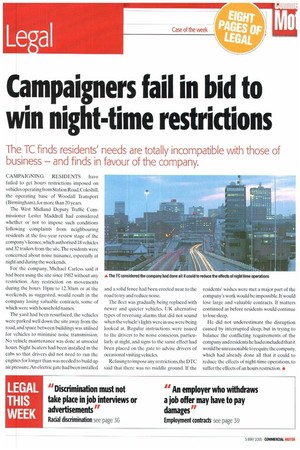Campaigners fail in bid to win night-time restridions
Page 31

If you've noticed an error in this article please click here to report it so we can fix it.
The IC finds residents' needs are totally incompatible with those of
business — and finds in favour of the company.
CAMPAIGNING RESIDENTS have failed to get hours restrictions imposed on vehicles operating from Station Road,Coleshili the operating base of Woodall Transport (B irmingham), for more than 20 years.
The West Midland Deputy Traffic Commissioner Lester Maddrell had considered whether or not to impose such conditions following complaints from neighbouring residents at the five-year review stage of the company's licence, which authorised 18 vehicles and 32 trailers from the site. The residents were concerned about noise nuisance, especially at night and during the weekends.
For the company, Michael Carless said it had been using the site since 1982 without any restriction. Any restriction on movements during the hours lOpm to 12.30am or at the weekends, as suggested, would result in the company losing valuable contracts, some of which were with household names.
The yard had been resurfaced, the vehicles were parked well down the site away from the road,and space between buildings was utilised for vehicles to minimise noise transmission. No vehicle maintenance was done at unsocial hours. Night heaters had been installed in the cabs so that drivers did not need to run the engines for longer than was needed to build up air press urc.An electric gate had been installed and a solid fence had been erected near to the road to try and reduce noise.
The fleet was gradually being replaced with newer and quieter vehicles. UK alternative types of reversing alarms that did not sound when the vehicle's lights were in use were being Looked at. Regular instructions were issued to the drivers to he noise conscious, particularly at night, and signs to the same effect had been placed on the gate to advise drivers of occasional visiting vehicles.
Refusing to impose any restrictions,the DTC said that there was no middle ground. If the residents' wishes were met a major part of the company's work would be impossible. It would lose large and valuable contracts. If matters continued as before residents would continue to lose sleep.
He did not underestimate the disruption caused by interrupted sleep, but in trying to balance the conflicting requirements of the company and residents he had concluded that it would be unreasonable to require the company, which had already done all that it could to reduce the effects of night-time operations, to suffer the effects of an hours restriction. •






































































































































































































